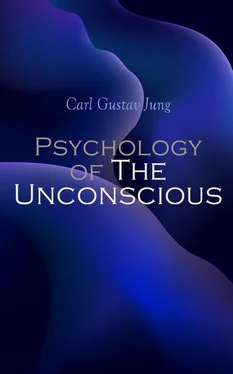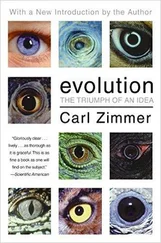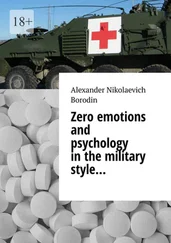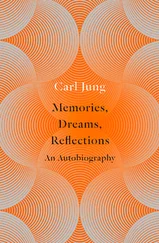With this we turn back to the question from which we digressed, namely, whether or not Miss Miller has created something valuable with her poem. If we bear in mind under what psychologic or moral conditions Christianity came into existence; that is to say, at a time when fierce brutality was an every-day spectacle, then we understand the religious seizure of the whole personality and the worth of that religion which defended the people of the Roman culture against the visible storms of wickedness. It was not difficult for those people to remain conscious of sin, for they saw it every day spread out before their eyes. The religious product was at that time the accomplishment of the total personality. Miss Miller not only undervalues her “sins,” but the connection between the “depressing and unrelenting need” and her religious product has even escaped her. Thus her poetical creation completely loses the living value of a religious product. It is not much more than a sentimental transformation of the erotic which is secretly carried out close to consciousness and principally possesses the same worth as the manifest content of the dream [99]with its uncertain and delusive perishableness. Thus the poem is properly only a dream become audible.
To the degree that the modern consciousness is eagerly busied with things of a wholly other sort than religion, religion and its object, original sin, have stepped into the background; that is to say, into the unconscious in great part. Therefore, to-day man believes neither in the one nor in the other. Consequently the Freudian school is accused of an impure phantasy, and yet one might convince one’s self very easily with a rather fleeting glance at the history of ancient religions and morals as to what kind of demons are harbored in the human soul. With this disbelief in the crudeness of human nature is bound up the disbelief in the power of religion. The phenomenon, well known to every psychoanalyst, of the unconscious transformation of an erotic conflict into religious activity is something ethically wholly worthless and nothing but an hysterical production. Whoever, on the other hand, to his conscious sin just as consciously places religion in opposition, does something the greatness of which cannot be denied. This can be verified by a backward glance over history. Such a procedure is sound religion. The unconscious recasting of the erotic into something religious lays itself open to the reproach of a sentimental and ethically worthless pose.
By means of the secular practice of the naïve projection which is, as we have seen, nothing else than a veiled or indirect real-transference (through the spiritual, through the logos), Christian training has produced a widespread weakening of the animal nature so that a great part of the strength of the impulses could be set free for the work of social preservation and fruitfulness. [100]This abundance of libido, to make use of this singular expression, pursues with a budding renaissance (for example Petrarch) a course which outgoing antiquity had already sketched out as religious; viz., the way of the transference to nature. [101]The transformation of this libidinous interest is in great part due to the Mithraic worship, which was a nature religion in the best sense of the word; [102]while the primitive Christians exhibited throughout an antagonistic attitude to the beauties of this world. [103]I remember the passage of St. Augustine mentioned by J. Burckhardt:
“Men draw thither to admire the heights of the mountains and the powerful waves of the sea—and to turn away from themselves.”
The foremost authority on the Mithraic cult, Franz Cumont, [104]says as follows:
“The gods were everywhere and mingled in all the events of daily life. The fire which cooked the means of nourishment for the believers and which warmed them; the water which quenched their thirst and cleansed them; also the air which they breathed, and the day which shone for them, were the objects of their homage. Perhaps no religion has given to its adherents in so large a degree as Mithracism opportunity for prayer and motive for devotion. When the initiated betook himself in the evening to the sacred grotto concealed in the solitude of the forest, at every step new sensations awakened in his heart some mystical emotion. The stars that shone in the sky, the wind that whispered in the foliage, the spring or brook which hastened murmuring to the valley, even the earth which he trod under his feet, were in his eyes divine; and all surrounding nature a worshipful fear of the infinite forces that swayed the universe.”
These fundamental thoughts of Mithracism, which, like so much else of the ancient spiritual life, arose again from their grave during the renaissance are to be found in the beautiful words of Seneca: [105]
“When you enter a grove peopled with ancient trees, higher than the ordinary, and whose boughs are so closely interwoven that the sky cannot be seen, the stately shadows of the wood, the privacy of the place, and the awful gloom cannot but strike you, as with the presence of a deity, or when we see some cave at the foot of a mountain penetrating the rocks, not made by human hands, but hollowed out to great depths by nature; it fills the mind with a religious fear; we venerate the fountain-heads of great rivers; the sudden eruption of a vast body of water from the secret places of the earth, obtains an altar: we adore likewise the springs of warm baths, and either the opaque quality or immense depths, hath made some lakes sacred.”
All this disappeared in the transitory world of the Christian, only to break forth much later when the thought of mankind had achieved that independence of the idea which could resist the æsthetic impression, so that thought was no longer fettered by the emotional effects of the impression, but could rise to reflective observation. Thus man entered into a new and independent relation to nature whereby the foundation was laid for natural science and technique. With that, however, there entered in for the first time a displacement of the weight of interest; there arose again real-transference which has reached its greatest development in our time. Materialistic interest has everywhere become paramount. Therefore, the realms of the spirit, where earlier the greatest conflicts and developments took place, lie deserted and fallow; the world has not only lost its God as the sentimentalists of the nineteenth century bewail, but also to some extent has lost its soul as well. One, therefore, cannot wonder that the discoveries and doctrines of the Freudian school, with their wholly psychologic views, meet with an almost universal disapproval. Through the change of the centre of interest from the inner to the outer world, the knowledge of nature has increased enormously in comparison with that of earlier times. By this the anthropomorphic conception of the religious dogmas has been definitely thrown open to question; therefore, the present-day religions can only with the greatest difficulty close their eyes to this fact; for not only has the intense interest been diverted from the Christian religion, but criticism and the necessary correction have increased correspondingly. The Christian religion seems to have fulfilled its great biological purpose, in so far as we are able to judge. It has led human thought to independence, and has lost its significance, therefore, to a yet undetermined extent; in any case its dogmatic contents have become related to Mithracism. In consideration of the fact that this religion has rendered, nevertheless, inconceivable service to education, one cannot reject it “eo ipso” to-day. It seems to me that we might still make use in some way of its form of thought, and especially of its great wisdom of life, which for two thousand years has been proven to be particularly efficacious. The stumbling block is the unhappy combination of religion and morality . That must be overcome. There still remain traces of this strife in the soul, the lack of which in a human being is reluctantly felt. It is hard to say in what such things consist; for this, ideas as well as words are lacking. If, in spite of that, I attempt to say something about it, I do it parabolically, using Seneca’s words: [106]
Читать дальше












